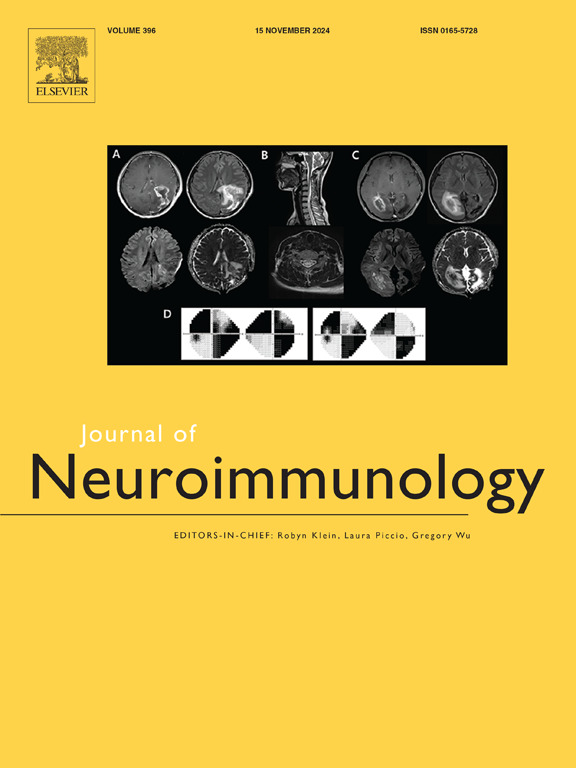MuSK抗体阳性重症肌无力患者的血清触发转录组变化,导致人肌管细胞肌肉萎缩和无力
IF 2.5
4区 医学
Q3 IMMUNOLOGY
引用次数: 0
摘要
重症肌无力(MG)是一种自身免疫性疾病,其特征是针对乙酰胆碱受体(AChR)或肌肉特异性酪氨酸激酶(MuSK)的自身抗体。这些自身抗体抑制ACh信号在神经肌肉交界处的传递,导致肌肉无力和疲劳。抗MuSK抗体阳性MG (MuSK+MG)比抗achr抗体阳性MG更少见,但更常导致肌肉萎缩。然而,其潜在机制尚不清楚。在本研究中,我们分析了麝香+MG患者的血清是否对培养的肌管细胞有致病作用。将原代人骨骼肌成肌细胞分化为肌管,然后用健康对照者或MuSK+MG患者的血清处理。1天后,进行RNA-seq分析和Western blotting,并测量肌管直径。咖啡因刺激后的钙动态也被评估。将健康对照血清处理的肌管细胞与MuSK+MG患者血清处理的肌管细胞进行比较,RNA-seq分析显示与肌肉功能相关的通路受到抑制,Western blotting分析显示II型肌球蛋白重链的表达降低。这些变化与肌萎缩和肌无力一致,尽管肌管直径保持不变。咖啡因刺激导致细胞质钙水平升高。肌节成分的表达明显降低。MuSK+MG患者的血清直接影响培养的人肌管细胞中基因和蛋白的表达,导致与肌肉萎缩和无力相关的变化。这些发现表明,除了神经肌肉连接处乙酰胆碱信号传递受损外,还有其他机制可导致MG患者肌肉无力和疲劳。本文章由计算机程序翻译,如有差异,请以英文原文为准。
Serum from patients with MuSK antibody-positive myasthenia gravis triggers transcriptomic changes leading to muscle atrophy and weakness in human myotube cells
Myasthenia gravis (MG) is an autoimmune disease characterized by autoantibodies targeting the acetylcholine receptor (AChR) or muscle-specific tyrosine kinase (MuSK). These autoantibodies inhibit ACh signal transmission at the neuromuscular junction, leading to muscle weakness and fatigue. Anti–MuSK antibody-positive MG (MuSK+MG) appears more rarely than anti–AChR antibody-positive MG but more frequently results in muscle atrophy. However, the underlying mechanism is unknown. In this study, we analyzed whether serum from MuSK+MG patients has any pathogenic effect on cultured myotube cells. Primary human skeletal muscle myoblasts were differentiated into myotubes, which were then treated with serum from healthy control individuals or MuSK+MG patients. After one day, RNA-seq analysis and Western blotting were performed and myotube diameters were measured. Calcium dynamics following caffeine stimulation was also assessed. Comparing myotube cells treated with healthy control serum with those treated with serum from MuSK+MG patients, RNA-seq analysis showed suppression of pathways associated with muscle function and Western blotting analysis revealed reduced expression of Type II myosin heavy chain. These changes are consistent with muscle atrophy and weakness, although myotube diameter remained unchanged. Caffeine stimulation induced higher cytoplasmic calcium levels. Expression of sarcomere components was significantly reduced. Serum from MuSK+MG patients directly affected gene and protein expression in cultured human myotube cells, leading to changes associated with muscle atrophy and weakness. These findings suggest that there are mechanisms in addition to impaired ACh signal transmission at the neuromuscular junction that can cause muscle weakness and fatigue in MG patients.
求助全文
通过发布文献求助,成功后即可免费获取论文全文。
去求助
来源期刊

Journal of neuroimmunology
医学-免疫学
CiteScore
6.10
自引率
3.00%
发文量
154
审稿时长
37 days
期刊介绍:
The Journal of Neuroimmunology affords a forum for the publication of works applying immunologic methodology to the furtherance of the neurological sciences. Studies on all branches of the neurosciences, particularly fundamental and applied neurobiology, neurology, neuropathology, neurochemistry, neurovirology, neuroendocrinology, neuromuscular research, neuropharmacology and psychology, which involve either immunologic methodology (e.g. immunocytochemistry) or fundamental immunology (e.g. antibody and lymphocyte assays), are considered for publication.
 求助内容:
求助内容: 应助结果提醒方式:
应助结果提醒方式:


